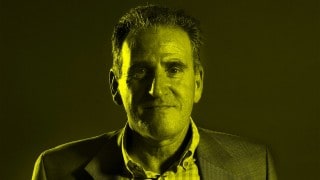The [30th] anniversary of Elvis Presley’s death has passed, and news reports have stressed his continuing influence on music, culture, and race relations. But those reports have missed Elvis’s greatest achievement: as a cultural immune response to totalitarianism.
Elvis fighting totalitarianism? Yes, really. To understand how, set the wayback machine for, oh, about 1935. Imagine that you’re a working-class guy with lousy prospects. You want to dress up in funny clothes, go to a major event with a terrific light show, and get a tremendous feeling of catharsis as, for a moment, you’re part of something bigger than yourself. You might even identify with the guy at the microphone, getting a vicarious sense of what it must be like to be the focus of such adoration. When you leave, you’ll feel bonded with a bunch of strangers: you all have something in common. You’re part of a culture that some people think is strange, but that you believe will conquer the world.
What are you going to do? Well, if you’re in Germany (where the prospects were particularly lousy) you could become a Nazi. Hitler will be the guy at the microphone, Leni Riefenstahl will do a hell of a job on the light show, and the funny clothes, well, you know.
Hitler - who was a mediocre artist, but a first-rate operational semiotician - knew how to work with symbols in order to give the crowd what it wanted, and to make the crowd do what he wanted. Indeed, as a superb documentary entitled The Architecture of Doom makes clear, Hitler’s program was to some degree shaped by his artistic leanings, and his artistic sense was a considerable asset in getting his message across.
Hitler was aided by a new technological innovation: the radio. Nazism’s totalitarian sibling, communism, spread largely by print and took decades to gain a foothold. But radio allowed Hitler to manipulate emotions wholesale, in a way that had never been possible before. And the masses - starved for entertainment and desperate for catharsis, and a sense of purpose - ate it up.
But now it’s all different, and Elvis deserves a lot of the credit. Oh, there were big stars before Elvis: Bing Crosby’s appeal is now nearly forgotten, but it was once huge, and Frank Sinatra was, in a way, a sort of proto-rock star. But after Elvis, the world was different.
Hitler used the tools provided by new technology. But Elvis owned them: radio, television, movies, it didn’t matter: he conquered them all. And the changes that he brought about helped to topple totalitarian regimes, and make new ones less likely, for he left behind a changed culture that short-circuited the mechanisms that Hitler had used to secure power - and the mechanisms that other regimes used to maintain it.
http://www.tcsdaily.com/article.aspx?id=082102B









